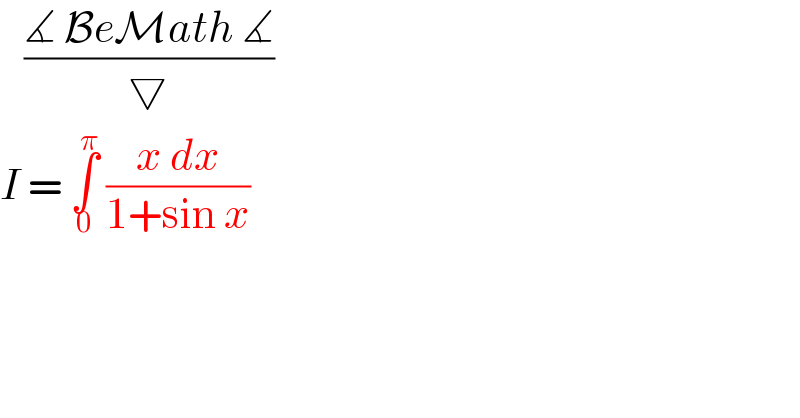Question Number 108391 by bemath last updated on 16/Aug/20

Answered by bobhans last updated on 16/Aug/20

Commented by khanshadab2405 last updated on 16/Aug/20
1/√1²+cot²∅
Commented by bobhans last updated on 16/Aug/20

Answered by Dwaipayan Shikari last updated on 16/Aug/20
![∫_0 ^π ((xdx)/(1+sinx))=∫_0 ^π ((π−x)/(1+sinx))dx=I 2I=∫_0 ^π (π/(1+sinx))dx 2I=2π∫_0 ^∞ (1/(1+((2t)/(1+t^2 )))).(1/(1+t^2 ))dt (tan(x/2)=t 2I=2π∫_0 ^∞ (1/((1+t)^2 )) I=π[−(1/(1+t))]_0 ^∞ I=π](https://www.tinkutara.com/question/Q108396.png)
Answered by mnjuly1970 last updated on 16/Aug/20
![I=∫_0 ^( π) (((π−x)dx)/(1+sin(π−x)))dx ⇒2I=π∫_0 ^( π) ((1−sin(x))/(cos^2 (x)))dx 2I=π([tan(x)]_0 ^π −[(1/(cos(x)))]_0 ^( π) )=π(2) I=π ♣...........♣](https://www.tinkutara.com/question/Q108398.png)
Answered by mathmax by abdo last updated on 16/Aug/20
![I =∫_0 ^π ((xdx)/(1+sinx)) changement x=π−t give I =∫_0 ^π (((π−t))/(1+sint))dt =π ∫_0 ^π (dt/(1+sint))−I ⇒2I =π∫_0 ^π (dt/(1+sint)) =_(tan((t/2))=u) π ∫_0 ^∞ ((2du)/((1+u^2 )(1+((2u)/(1+u^2 ))))) =2π ∫_0 ^∞ (du/(1+u^2 +2u)) =2π ∫_0 ^∞ (du/((u+1)^2 )) =2π[−(1/(u+1))]_0 ^(+∞) =2π ⇒ 2I =2π ⇒ I =π](https://www.tinkutara.com/question/Q108405.png)
Answered by mathmax by abdo last updated on 16/Aug/20
![another way changement tan((x/2))=t give I =∫_0 ^∞ ((2arctan(t))/((1+((2t)/(1+t^2 )))))((2dt)/(1+t^2 )) =4∫_0 ^∞ ((arctant)/(1+t^2 +2t))dt =4∫_0 ^∞ ((arctant)/((t+1)^2 ))dt =_(byparts) 4{[−((arctant)/(t+1))]_0 ^(+∞) +∫_0 ^∞ (1/(t+1))(dt/(1+t^2 ))} =4 ∫_0 ^∞ (dt/((t+1)(t^2 +1))) let decompose F(t) =(1/((t+1)(t^2 +1))) F(t) =(a/(t+1)) +((bt +c)/(t^2 +1)) a =(1/2) , lim_(t→+∞) tF(t) =0 =a+b ⇒b=−(1/2) F(0) =1 =a +c ⇒c=1−a =(1/2) ⇒F(t)=(1/(2(t+1)))+((−(1/2)t +(1/2))/(t^2 +1)) ⇒ ∫_0 ^∞ F(t)dt =(1/2)∫_0 ^∞ (dt/(t+1))−(1/4)∫_0 ^∞ ((2t)/(t^2 +1)) +(1/2)∫_0 ^∞ (dt/(1+t^2 )) =[(1/2)ln(t+1)−(1/4)ln(t^2 +1)]_0 ^∞ +(1/2)[arctant]_0 ^∞ =[ln(((√(t+1))/((^4 (√(t^2 +1))))))]_0 ^(+∞) +(1/2){(π/2)} =(π/4) ⇒I =4.(π/4) ⇒I =π](https://www.tinkutara.com/question/Q108408.png)
